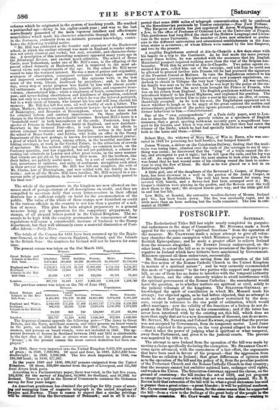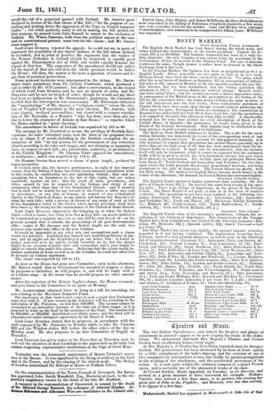POSTSCRIPT.
SATURDAY.
The Ecclesiastical Titles Bill last night nearly completed its purgato- rial endurances in the stage of Committee. Mr. lifoxsztt made a fresh appeal for the exemption of "spiritual functions" from the operation of
the measure. Mr. CRAWFORD made a minor attempt to give all volim- tary churches the same exemption which Ministers propose to give to the Scottish Episcopalians; and he made a greater effort to relieve Ireland from the measure altogether. Sir ROBERT INous endeavoured, on the other hand, to extend the bill so as to repress invasions of the Queen's pre- rogative in Ireland which have hitherto been sanctioned by Government Ministers opposed all these endeavours, successfully. Mr. Mosmair. moved a proviso saving from the operation of the bill "the free action of the Roman Catholic Church in the United Kingdom in matters of a spiritual nature"; and he very earnestly reoommended this mode of "agreement" to the two parties who support and oppose the bill, as one of them has no desire to interfere with the temporal authority of the Queen, and the other sincerely wishes to avoid interference with the spiritual government of the Roman Catholics : the amendment would leave the question, as to whether matters are spiritual or civil, solely to the judicial tribunals of the kingdoms. The SOLICITOR-GMZERAL ac- knowledged the spirit of conciliation in which Mr. Monsell made his attempt ; but objected again, as he had before objected, that no attempt is made to show how spiritual action is anyhow restrained by the mea- sure, except in reference to the one point of ordination, which would affect marriages : now the validity of the functions of a bishop do not de- pend on the title of his see, but on his consecration ; and if the latter has never been interfered with by the existing act, this bill, which does no more than apply that sett° a new denomination of dioceses, can do no more. Mr. Scuitv, Mr. Santana, and Colonel RAWDON, regretted that the proviso was not accepted by. Government, from its temperate mover. Lord Joins RUSSELL objected to the proviso, on the very ground alleged in its favour -that it takes the power of judging what is spiritual or what temporal, away from Parliament, and gives it to the judicial courts. The proviso was negatived by 160 to 42.
The attempt to save Ireland from the operation of the bill was made by moving a clause specifically declaring the exemption. Mr. SHARMAN CRAW- FoRD again advanced, with the earnestness of a last effort, the arguments that have been used in favour of his proposal-that the aggression from Rome has no relation to Ireland; that great differences of opinion exist as to the operation of thelnll and the policy of it, from the peculiar position of the Protestant Church and the Homan Catholic Church in that country; that the measure cannot but embitter national hate, endanger civil rights, and weaken the Union. The Soucrron-Gasinasi opposed the clause, on the ground of consistency : the bill recites the act of 1829, and yet proposes to except the very country for which that act was mainly passed. Mr. E. B. ROCHE held that extension of the bill will be what a great statesman has said is greater than a great crime-a great blunder ; it will be political madness. Mr. CAVENDISH supported the clause, for the same reason that he supported the bill-from a view to the feelings of the great body of the people in the respective conntriee, Mr. CLAT would vote for the clause-wishing to avoid the risk of a perpetual quarrel with Ireland. Mr, ANgrEy agese declared in favour of the fret clause of the bill--"for flae,puz.pose of an- nulling and Putting down the aggression of the Pope on-English temporal rights" ; but while perfectly ready to aid ia making the bill perfect for that. purpose, he prayed Lord John Russell to assent to the exclusion of Ireland. Mr. Wnao-PEOSevat, both from the political aspect of the case and on constitutional ground, must vote for the clause; and Mr. Gown must support it Lord JORN RUSSELL rejected the appeals : he could not see in point of argument the possibility of any logical defence of the bill unless Ireland be included; and in point of practice, the argument that the wishes of the Roman Catholics in Ireland should be respected, is equally good against the Finsucipation Act of 1829, and would equally demand the repeal of that law. The supporters of the amendment should ask rather for the repeal of that act, and then the whole question would be before the House : till then, the matter is far more a question of reason and lo- gic than of practical persecution. Some personal incidents were interspersed in the debate. Mr. Dams- MOND made quotations from The Catholic Vindicator, which produced a call to order by Mr.O'Feensirre - but after a conversation, in the course of which Lord Jotter RUSSELL said he saw no breach of order, and Mr. DISRAELI said he-saw no breach of order, though he would not say there had been no indiscretion in Mr. Drummond's quotations, the CHAIRMAN decided that the interruption was unnecessary. Mr. REYNOLDS criticized the " meanderings " of Mr. Anstey, a "religious exotic," whom the elec- tors of Youghal will repudiate at the next election. Mr. ANETE; with some dignity, declined personalities ; but closed with a counter repudia- tion of Mr. Reynolds, as a Member "who has done more than any one else to lower the 'character of debates in that House,"—a repartee which the House ratified by "great cheering."
The amendment in favour of Ireland was negatived by 2.55 to 60.
The attempt by Mr. Crawford to secure the privilege of Scottish Epis- copalians for other voluntary sects, took the form of the proposed inser- tion in clause 3 of words including in the Scottish exemption the as- sumption of title "by any person, for the government of any voluntary church according to its rules and usages, and not claiming or asenming to have, in respect of such title, any jurisdiction, authority, or preeminence, in the United Kingdom." Sir GEORGE GR.EY opposed the amendmeat, as ambiguous ; and it was negatived by 118 to 33.
Sir Romer INGLIS then moved a clause of great length, prefaced by many preambles. It recited, inter :die, the Queen's preeminence, in right of her imperial crown; that the Bishop of Rome has of late years assumed jurisdiction with- in this realm, by constituting sees and appointing bishops; that such as- sumptions have no foundation in the law of this realm, but are rather manifestly against all law ; that the grant of rank, precedence, and titles, cannot by law be imparted to the bishops and clergy of any communion other than that of the Established Church : and it enacted, that it shall not be lawful for any servant of the Crown to allow any rank or precedence' or any title of honour, in respect of any ecclesiastical dignity in the Church of Rome, to any person not having her Majesty's Ii- cease fur such title ; with a proviso in favour of any usage of rank or title in an depeedeney ceded to the Crown where special provision shall have been made by the treaty for the maintenance of the Church of Rome therein.
Lord Joule Ruessux objected to the bringing up of what Sir Robert Inglis called a clause, bias what is in fact a long bill—as much entitled to be considered as a separate mere-sire as any bill he ever heard of—on the general ground that it attacks the proceedings of all past Governmente alike : under it MT. Spooner and Sir Robert Inglis are the only two persons who could take office in the new Cabinet
It would be .impossible to say what acts and assumptions such a (demi° would nut interdict. Lord John had himself met Archbishop Murray at din- ner, and he might ask the Archbishop to go out before hem: it would be proper and civil so to do, and he should certainly do it ; but the dinner might be an occasion of public state and ceremonial, and a jury might be asked to convict him under this clause. Believingthat the clause would in- troduce confusion at home as well as in the Colonies, he couldnot allow it to be brought up without oppostsion.
The slause was rejected by 166 to 121.
As soon as the House had gone into Committee, early in the afternoon, Mr. %noon stated, that as Government has assented to support a clause he proposes to introduce, he will prepare it, and will be ready with it at a future stage : in the mean time lw should propose no other amend- ments.
After the rejection of Sir Robert Inglis's clause, the House resumed ; and gave leave to the Committee to sit again on Monday.
Mr. LABOVCEEKE obtained leave to hring in a bill for :unending the acts relating to the Merchant Seamen's Fund. The insolvency, of that fund is now come to such a point that Parliament must deal with it. If now wound up the deficiency will be, according to the calculation of Mr. Finlaison, no less than 800,000/. The seamen cannot be reconciled to an immediate increase of the fund out of their wages: so it is propesed to wind up the fund by the assistance of the State. The burden will be 600,0001. or 700,0001. distributed over thirty years ; and the fund will be , administered under stringent supervision by the -Board of Trade.
Lord Jowl Russet'. stated, that be proposes, in accordance with the , wish expressed by Mr. DISP.AELI on Monday night, to take the Customs ' Bill and the Window-duties Bill before the other orders of the day on Monday next. He also proposes to go into Committee of Supply on Thursday.
Lord STANLEY has given notice to the Peers that on Thursday next he will call the attention of their Lordships to the papers laid on the table last session respecting representative institutions at the -Cape of Good Hope.



























 Previous page
Previous page